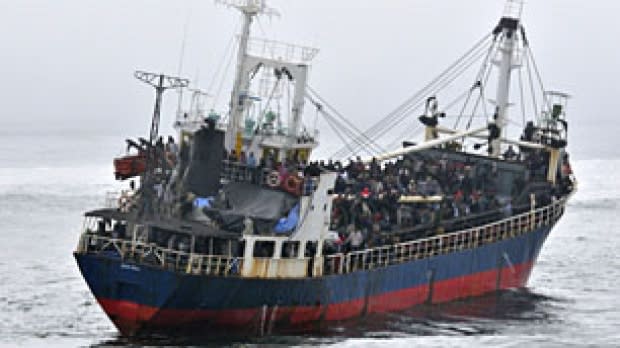New trial ordered for only person convicted in MV Sun Sea's Tamil smuggling case
B.C.'s appeal court has ordered a new trial for the only man ever convicted in a high-profile human smuggling case that saw 492 Tamil asylum seekers land off the West Coast in a dilapidated cargo ship in August 2010.
In one of a pair of setbacks for Crown prosecutors Tuesday, the appeal court found that the lower court judge who oversaw Kunarobinson Christhurajah's second trial erred in her instructions to the jury.
In a separate but related decision, B.C.'s top court also rejected a bid to overturn the acquittals of three other Sri Lankan men who were tried in connection with the perilous journey of the MV Sun Sea to Canada from Thailand.
Taken together, the lengthy decisions underscore both the "frailties" of the Crown's evidence and the difficulty of untangling motives in a case where smugglers and smuggled alike claimed to be seeking refuge from civil war.
'Mutual purpose of seeking refuge'
Christhurajah was allegedly one of the owners of the ship, but was also seeking asylum with his pregnant wife.
The appeal court found that the judge who conducted his trial should have instructed the jury to consider whether Christhurajah and the other asylum seekers aboard the MV Sun Sea "had the mutual purpose of seeking refuge."

The reasoning comes out of a Supreme Court of Canada decision which says providing humanitarian assistance or mutual aid to other asylum seekers can be legitimate defences for people accused of human smuggling.
The defence isn't available to an accused who is part of a criminal network.
The Crown argued Christhurajah was the managing director of the company that owned the MV Sun Sea and "helped transport migrants to the vessel, procured supplies, and occupied a privileged position on the vessel."
But Christhurajah claimed there was no evidence connecting him to the company in the months before the vessel was purchased and that "there was no evidence he had received any profit from the voyage."
'Begged him to be the ship's captain'
Christhurajah's first trial ended in a mistrial and he was convicted after a second trial in May 2017.
He was sentenced to four years, but was released since he had already spent nearly twice that much time behind bars awaiting trial.
Christhurajah's wife gave birth to his daughter in Canada. They both attended his second trial.

In total, five people were charged in connection with the dangerous journey of the ship which took nearly a month to sail from the Thai coast to the shores of British Columbia.
One of the accused died before he could be tried.
A jury acquitted the three others — Lesly Jana Emmanuel, Thampeernayagam Rajaratnam and Nadarajah Mahendran — after a trial that saw testimony about the desperation of migrants to flee the horrors of war in Sri Lanka.
The Crown believed that Emmanuel was the captain of the ship.
He testified that he and his girlfriend were shot escaping Sri Lanka after his village was destroyed by the army, who used villagers as human shields.
He trained as a sailor and claimed he paid $15,000 for the voyage to Canada.
He said that the "other migrants begged him to be the ship's captain" after the Thai crew abandoned the ship.
'Sole motivation'
The other two accused were not aboard the MV Sun Sea. They entered Canada at Pearson Airport in Toronto almost a month before the ship landed. The Crown believed that they were involved in organizing the transfer of the migrants.
The lower court judge who conducted the trial for the three men told the jury the Crown had to prove that "they were not providing humanitarian aid to asylum-seekers and were not themselves asylum-seekers who were providing mutual aid."

The Crown appealed on a variety of grounds, including the claim the judge should have told the jury an accused's "sole" purpose had to be humanitarian — limiting the possibility of a successful defence.
But the appeal court disagreed.
"In our view, it is unrealistic to expect someone to have a sole motivation in respect of an action as complex and demanding as transporting asylum seekers to the Canadian border," the judges wrote.
'Significant frailties'
In the end, the appeal court found that — when it came to the three men who were acquitted — the distinction over the humanitarian defence wouldn't have made much of a difference anyway.
The judges said the jury "simple believed" Emmanuel's evidence.
And as for the two other men, the appeal court ruling says they would have been acquitted regardless because of weaknesses with the Crown's case.
Witnesses had troubles with their memories and the RCMP didn't follow procedure.
"The identification evidence led by the Crown had significant frailties," the judges wrote.
"The RCMP did not conduct the photo lineups in accordance with best practices. The jury would likely have paid close attention to the shortcomings of those lineups."


